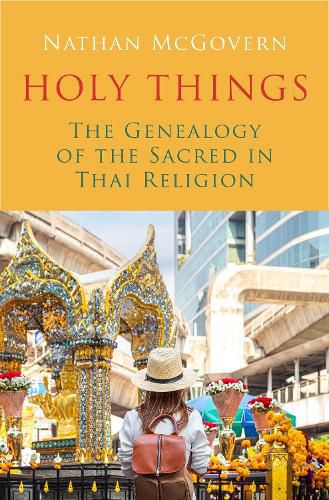Readings Newsletter
Become a Readings Member to make your shopping experience even easier.
Sign in or sign up for free!
You’re not far away from qualifying for FREE standard shipping within Australia
You’ve qualified for FREE standard shipping within Australia
The cart is loading…






Scholars of religion have mostly abandoned the concept of "syncretism" in which certain apparent deviations from "standard" practice are believed to be the result of a mixture of religions. This is particularly relevant to Thailand, in which ordinary religious practice was seen by an earlier generation of scholars as a mixture of three religions: local spirit religion, Hinduism, and Buddhism. In part, the perception that Thai Buddhism is syncretistic is due to a misunderstanding of traditional Buddhism, which has always accepted the existence of local spirits and gods. Nevertheless, there are aspects of Thai Buddhist practice that still stubbornly appear syncretistic. Moreover, Thai Buddhists themselves are increasingly adopting the language of syncretism, referring to traditional Thai religion as a mixture of local, Hindu, and Buddhist practices. This raises the question: If syncretism is so wrong, then why does it seem so right?In Holy Things, Nathan McGovern answers this question through an in-depth study of the worship of spirits, gods, and Buddha images--all known as sing saksit, or "holy things"--in Thailand. He takes the reader on a historical and genealogical journey, showing how the category saksit began as a term to describe a power that is inherent to gods and spirits and accessible to Brahmans. Only later, when it was used in the nineteenth century to translate the Western concept of the "holy" did it become associated with Buddhist practice. McGovern shows that what appears to be syncretism is actually an illusion. The worship of "holy things" is not a mixture of different religions, but the category of "holy things" is a mixture of different ways of talking about religion.
$9.00 standard shipping within Australia
FREE standard shipping within Australia for orders over $100.00
Express & International shipping calculated at checkout
Scholars of religion have mostly abandoned the concept of "syncretism" in which certain apparent deviations from "standard" practice are believed to be the result of a mixture of religions. This is particularly relevant to Thailand, in which ordinary religious practice was seen by an earlier generation of scholars as a mixture of three religions: local spirit religion, Hinduism, and Buddhism. In part, the perception that Thai Buddhism is syncretistic is due to a misunderstanding of traditional Buddhism, which has always accepted the existence of local spirits and gods. Nevertheless, there are aspects of Thai Buddhist practice that still stubbornly appear syncretistic. Moreover, Thai Buddhists themselves are increasingly adopting the language of syncretism, referring to traditional Thai religion as a mixture of local, Hindu, and Buddhist practices. This raises the question: If syncretism is so wrong, then why does it seem so right?In Holy Things, Nathan McGovern answers this question through an in-depth study of the worship of spirits, gods, and Buddha images--all known as sing saksit, or "holy things"--in Thailand. He takes the reader on a historical and genealogical journey, showing how the category saksit began as a term to describe a power that is inherent to gods and spirits and accessible to Brahmans. Only later, when it was used in the nineteenth century to translate the Western concept of the "holy" did it become associated with Buddhist practice. McGovern shows that what appears to be syncretism is actually an illusion. The worship of "holy things" is not a mixture of different religions, but the category of "holy things" is a mixture of different ways of talking about religion.